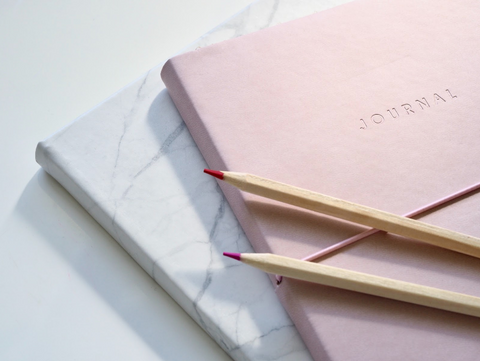So we’ve all heard about journaling, but how many of us actually take the time to put pen to paper for anything other than work or school? Unfortunately we often don’t prioritise ourselves and our self care as much as we do our jobs, relationships, children and everything else we need to do. But journaling may just be that simple easy tool for your toolkit that fits effortlessly into your already busy life.
Whether it's something you’ve always wanted to try that you know you should but just never found the time or maybe this is your first time hearing about journaling as therapy, this guide is a friendly little reminder of why and how you can start a simple journaling habit right now that’s way more affordable than your therapist (and maybe just as good!)

Photo by Jess Bailey Designs from Pexels
But why is journaling so good for you? Well, you know those million thoughts that race around and around your head on a daily basis? Maybe there's some persistent thought that keeps coming up or maybe it’s every little detail? Or a social encounter or relationship issue that is constantly in the back of your mind? I’m sure you can agree with us that being in that anxious state of mind with thoughts here, there and everywhere can feel really overwhelming sometimes.
What journaling does is allows some distance between you and your thoughts. It is your chance to get some space! By pulling those thoughts out of your brain and physically on to paper, you can start to visualise and understand exactly what's going on inside that beautiful mind of yours.

Photo by Polina Kovaleva from Pexels
If you’re anything like us, we like to know the scientifically backed benefits of things to help us to stick to our healthy habits and journaling has a whole host of proposed benefits from strengthening your immune system, reducing inflammation, improving cognitive functions & anxiety and managing depression. You can check out one of our favourite studies here.
Whether you follow the science or not, it is undeniable that journaling has been used for decades by our ancestors, and whether they knew why they were putting pen to paper (or chalk to stone if you want to go that far back) they were naturally drawn to the practice of writing out their thoughts and stories. The act of writing is so simple yet on a deeper level it is actually occupying your left brain, the thinking and rational side which is usually busy making a lot of noise in our minds. While your left brain is busy, your right brain is free to create, be intuitive and feel - and doesn’t that feel liberating!
Journaling helps us with stress management, removes mental blocks and allows you to use all of your brainpower to understand and make sense of yourself and whatever might be going on around you. So next time your mind is racing, pick up a pen and paper and just see what comes out!
There really is no right or wrong when it comes to journaling, so commit to just giving it a go without any judgement or criticism on yourself.
And if you need a little extra motivation, we’re sharing our go to journaling prompts that you can use daily (we like to add journaling as part of our morning routine) but see what works for you. Any opportunity to unravel and understand our thoughts is always a good thing, even if you’ve only got 5 minutes to spare.
So bust out your favourite pen, something special to write in, light some candles or incense, pour yourself a cup of tea and enjoy!
P.S This can also be done on your morning or evening commute to work too, so there’s no reason why you can’t start today.

Photo by Vlada Karpovich from Pexels
Our go to journal prompts
- How am I feeling today? Mentally? Physically? Emotionally?
- What am I calling into my life right now? E.g more love, greater fulfilment
- How would it feel to have those things?
- My intention for today (if writing in the morning) or for tomorrow (if writing at night) is…
- Name a thoughtful way you’ve supported a friend recently. Then write down how you can do the same for yourself.
- Use 10 words describe yourself
- Write a list of questions which you would like answers to
- What are 3 topics/things/activities you would like to learn more about?
- Write about a time when your work felt real to you. I.e fulfilling and satisfying
- I feel most alive and inspired when…
- How can I support myself to better achieve those things to feel alive and inspired?
- I couldn’t imagine living without…. (name as many things/people/places as you can think of)
- Today I am grateful for (write 3 things and try to change them each time you answer this question)
